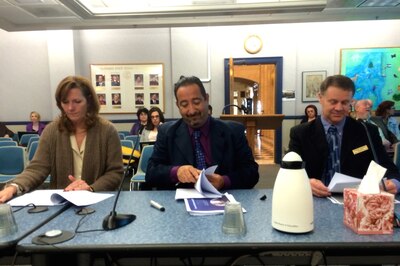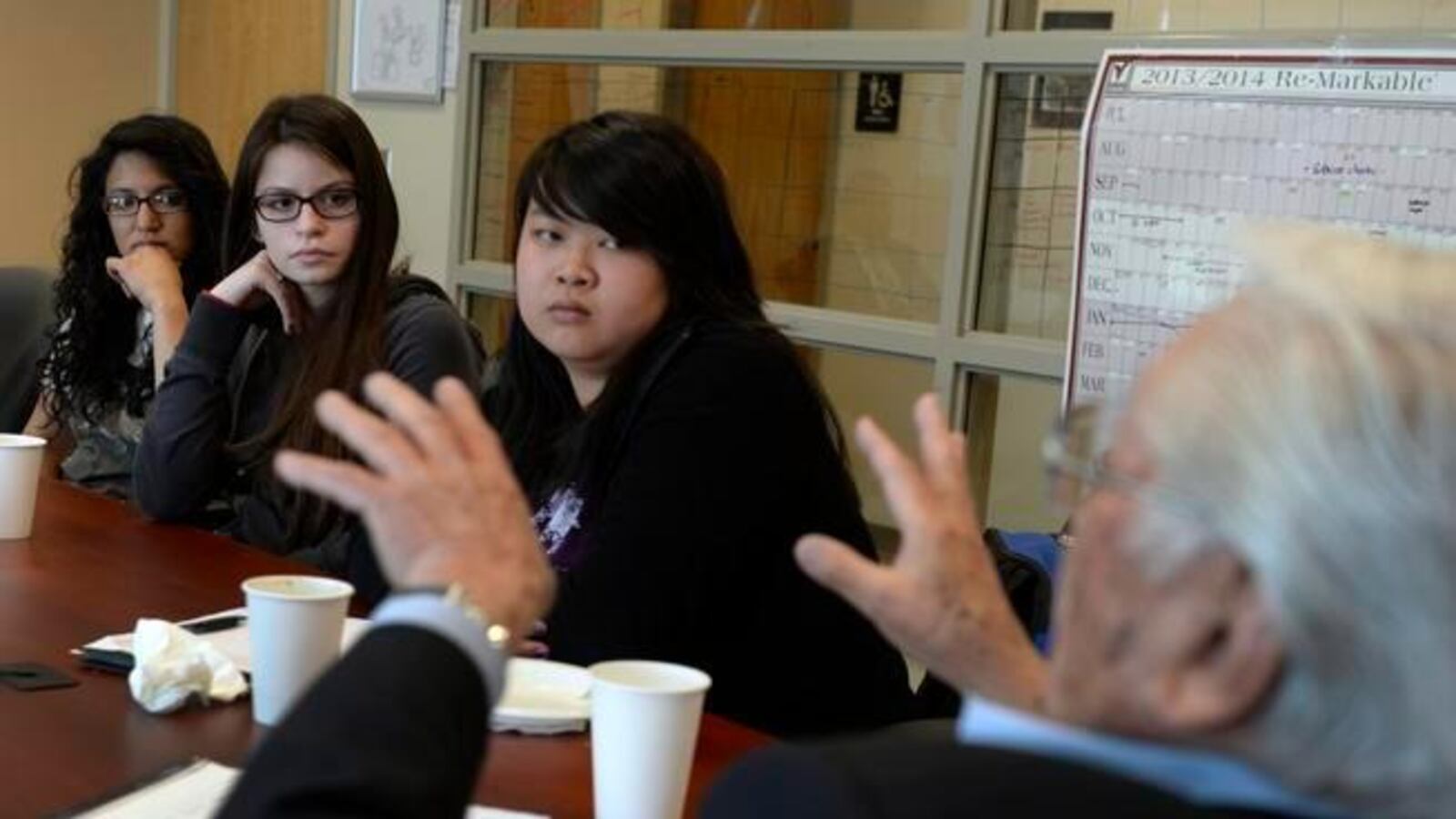A suburban Denver school board is poised to select its next superintendent, who will face the formidable challenge of leading a school district that has run out of time to improve its performance on state tests and is expected to be hit with state sanctions.
The Adams 14 school board on Wednesday is expected to choose between two finalists for the top job in the Commerce City-based district: Mark Payler, the current superintendent of the tiny Custer County school district, and Javier Abrego, a retired superintendent from Arizona.
The board’s choice will replace Pat Sanchez, who left to lead a smaller school district in the Bay Area.
The next superintendent likely will be one of the first school leaders in Colorado to face sanctions from the State Board of Education for consistently low-performing schools. The choice is so critical, former Education Commissioner Rich Crandall took the unusual step of sending a letter to the school board outlining the state’s recommendations for the district’s next leader.
But that isn’t the only challenge for the 7,000 student-district, which serves a high proportion of low-income families.
The next superintendent must also complete a series of changes in how the district educates Latino and immigrant students as outlined in an agreement the district reached with the U.S. Department of Education’s Office of Civil Rights in 2014.
All the while, the next chief must mend relations with a community that has failed to pass a tax increase for its schools in several years and is threatening a recall of the district’s school board.
“It’s a lot to juggle,” said Peter Sherman, the state’s chief school improvement officer. “There are some complexities there.”
The candidates
Finding a superintendent with successful experience improving student learning has been paramount in the search, said David Rolla, the Adams 14 school board president.
“We want somebody who has been involved in turnaround before so hopefully we don’t have to give up any of our schools,” Rolla said. “Many of our schools are right there. They just need someone to get them over the hump where we need them to be.”
Among the qualities in a turnaround leader outlined in former Commissioner Crandall’s letter: someone who can take swift action, sets high expectations and can change school culture.
Both finalists, according to their resumes posted on the district’s website, have that experience.
Payler, the Custer County schools chief, previously ran the Fort Lupton-based Weld District 8 school district. That district was once on the state’s watch list for poor academic achievement. The district was off the list in three years under Payler’s leadership, according to state data.
Payler left the Weld 8 district after he was subject to community criticism about test scores and teacher morale — criticism that didn’t hold up to scrutiny.
The other candidate, Abrego, began his career as a teacher and principal in Chicago Public Schools. He eventually landed in Arizona, where between 2009 and 2014 he helped lift two different districts’ ratings from failing to passing on Arizona’s state report card, according to his resume.
One challenge either finalist would face if he wins the job is the size of the district. Neither candidate has any experience running a district as large. Payler’s Weld 8 serves about 2,100 students, and the largest district Abrego ever ran had 4,500 students.
Tick tock
The most pressing matter facing Adams 14 is that the district and its lone high school have reached the end of the state’s accountability timeline.

Since 2010, the district as a whole and Adams City High School have failed to meet state expectations on state tests and other factors such as graduation requirements. Because of this, the State Board next year may ask the district to turn over the high school to a charter network or close the school. The district could lose its accreditation with the state, putting federal funding at risk and potentially devaluing high school diplomas.
Sanchez’s administration laid the foundation for a different alternative: Each of the district’s 10 schools, including Adams City High, is in the process of seeking “innovation status” from the state.
Innovation status under Colorado law would free the schools from a variety of district and state policies such as the district’s calendar and curriculum, and from the state’s teacher evaluation law. Schools could also employ teachers outside of the district’s union contract.
The district’s work has not stopped in Sanchez’s absence, said Janelle Asmus, the district’s spokeswoman.
“We’re still putting flesh on the bones,” she said, adding that schools are in various stages of developing their plans.
But it’s unclear whether seeking innovation status will be enough to appease the state. A recent report has cast new doubt that innovation status is enough to improve struggling schools, as the architects of the law had hoped. And some State Board members have said they’ll hold those schools seeking innovation status to improve student learning to a high bar.
Federal agreement still in place
Among Sanchez’s marching orders when hired in 2013 was to change the way the district educated its Latino students and English language learners.
In a 2014 investigation, the U.S. Department of Education found the district under previous leadership had created a hostile environment for Latino students and staff. Among the charges: that administrators targeted Latino teachers with increased job scrutiny and forbid students from speaking in Spanish.
Sanchez’s administration agreed to a lengthy list of changes, including regular climate surveys and more training for teachers.
His successor must continue that work. A spokesman for the U.S. Department of Education said the department is still monitoring the district. And board president Rolla said the board will direct the new leader to address a handful of changes Sanchez did not complete.
Recall
While relationships between the school district and the Commerce City community have been strained for years, the search for a new superintendent comes as some are threatening to recall members of the Adams 14 school board.
Ricardo Rohca, an organizer with Voz Catorce, a community group that has been critical of the school board, said discrimination is still rampant in the district.
“I think that our community as a whole is ready to take a strong stand against what’s been going on for decades,” Rocha said.
He said his group is prepared to launch a recall if its requests for greater transparency and a community forum to discuss unresolved discrimination complaints and education issues in the community aren’t met.
Rolla dismissed Rohca and Voz Catorce’s demands and threat of recall as local politics.
“If it comes, let it be,” Rolla said. “I’ll go by what the community wants. As far as me, I’m not going to worry about it.”
State officials are aware of the tension in Adams 14 and have called on the new superintendent to address the rift.
“The new superintendent will need relationship skills and be able to lead and manage a very diverse group of people from his school board, to his principals, to his district staff,” Sherman said. “It’s important that the new leader is able to mend relationships and the divisiveness that has happened in that community.”

